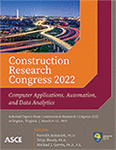Artificial Intelligence for Equitable Practices in Energy Infrastructure: Literature Review
Publication: Construction Research Congress 2022
ABSTRACT
Artificial intelligence is rapidly expanding into energy infrastructure for its implementation in smart grid integration, energy management, and electric vehicle production. However, research indicates AI techniques are often biased against racial, gender, and socioeconomic minorities. This paper is a preliminary review of current AI techniques for predictive modeling and applications in energy engineering and construction. This work was completed through the qualitative coding of 71 publications relating to artificial intelligence, energy infrastructure, and bias. Government researchers, construction leaders, scholars, and technologists rely on AI systems daily to analyze energy consumption, enhance power distribution, and ensure safe transportation. Therefore, in order to construct an accurate and inclusive AI technology for energy infrastructure this discrimination cycle must be identified, addressed, and eliminated. The literature review examines the application of AI primarily in smart buildings, smart homes, and smart grid technology. This work highlights the insufficient attention to social and economic inequities in energy automation.
Get full access to this article
View all available purchase options and get full access to this chapter.
REFERENCES
Allam, Z., and Dhunny, Z. A. (2019). “On big data, artificial intelligence and smart cities.” Cities, 89, 80–91.
Arroyo, P., Schöttle, A., and Christensen, R. (2021). The Ethical and Social Dilemma of AI Uses in The Construction Industry.
Buolamwini, J., and Gebru, T. (2018). Gender Shades: Intersectional Accuracy Disparities in Commercial Gender Classification. 15.
Deo, R. C., Şahin, M., Adamowski, J. F., and Mi, J. (2019). “Universally deployable extreme learning machines integrated with remotely sensed MODIS satellite predictors over Australia to forecast global solar radiation: A new approach.” Renewable & sustainable energy reviews, Elsevier Ltd, 104, 235–261.
Dong, B., Shi, Q., Yang, Y., Wen, F., Zhang, Z., and Lee, C. (2021). “Technology evolution from self-powered sensors to AIoT enabled smart homes.” Nano energy, Elsevier Ltd, 79.
Elsisi, M., Soliman, M., Aboelela, M. A. S., and Mansour, W. (2018). “Improving the grid frequency by optimal design of model predictive control with energy storage devices.” Optimal control applications & methods, Wiley Subscription Services, Inc, 39(1), 263–280.
Esser, P., Rombach, R., and Ommer, B. (2020). “A Note on Data Biases in Generative Models.”.
Frost, E. K., and Carter, S. M. (2020). “Reporting of screening and diagnostic AI rarely acknowledges ethical, legal, and social implications: a mass media frame analysis.” BMC medical informatics and decision making, BioMed Central Ltd, England, 20(1), 325–325.
Govardhan, M., and Roy, R. (2015). “Generation scheduling in smart grid environment using global best artificial bee colony algorithm.” International journal of electrical power & energy systems, Elsevier Ltd, 64, 260–274.
Jha, S. K., Bilalovic, J., Jha, A., Patel, N., and Zhang, H. (2017). “Renewable energy: Present research and future scope of Artificial Intelligence.” Renewable & sustainable energy reviews, Elsevier Ltd, 77, 297–317.
Jiao, J. (2020). Application and prospect of artificial intelligence in smart grid. IOP Publishing, 22012-.
Ko, C.-H., and Cheng, M.-Y. (2003). “Hybrid use of AI techniques in developing construction management tools.” <https://reader.elsevier.com/reader/sd/pii/S0926580502000912?token=4EF84CF07DEA3E00497129FF911D367E4D81CB11BDD8D18F833CA0DC77CB6C1979390E660A3C933526A71B7D535A4147&originRegion=us-east-1&originCreation=20210901213619>(Sep. 1, 2021).
Kumar, N. M., Chand, A. A., Malvoni, M., Prasad, K. A., Mamun, K. A., Islam, F. R., and Chopra, S. S. (2020). “Distributed Energy Resources and the Application of AI, IoT, and Blockchain in Smart Grids.” Energies (Basel), MDPI AG, 13(21), 1-.
Lambrecht, A., and Tucker, C. (2019). “Algorithmic Bias? An Empirical Study of Apparent Gender-Based Discrimination in the Display of STEM Career Ads.” Management science, INFORMS, 65(7), 2966–2981.
Leavy, S. (2018). “Gender bias in artificial intelligence: the need for diversity and gender theory in machine learning.” GE ’18, ACM, 14–16.
Maali, O., Lines, B., Smithwick, J., Hurtado, K., and Sullivan, K. (2020). Best Practices of Organizational Change Management for Adopting New Technologies within the AEC Industry. American Society of Civil Engineers, 358–367.
Minsky, M. (1961). “Steps toward Artificial Intelligence.” Proceedings of the IRE, 49(1), 8–30.
Mishra, M. (2021). “Machine learning techniques for structural health monitoring of heritage buildings: A state-of-the-art review and case studies.” Journal of Cultural Heritage, 47, 227–245.
Mocanu, E., Nguyen, P. H., Gibescu, M., and Kling, W. L. (2016). “Deep learning for estimating building energy consumption.” Sustainable Energy, Grids and Networks, 6, 91–99.
Oh, S., Jung, Y., Kim, S., Lee, I., and Kang, N. (2019). “Deep Generative Design: Integration of Topology Optimization and Generative Models.” Journal of Mechanical Design, 141(11), 111405.
Qela, B., and Mouftah, H. T. (2012). “Observe, Learn, and Adapt (OLA)-An Algorithm for Energy Management in Smart Homes Using Wireless Sensors and Artificial Intelligence.” IEEE transactions on smart grid, IEEE, 3(4), 2262–2272.
Rodríguez-Rodríguez, I., González Vidal, A., Ramallo González, A. P., and Zamora, M. Á. (2018). “Commissioning of the Controlled and Automatized Testing Facility for Human Behavior and Control (CASITA).” Sensors (Basel, Switzerland), MDPI, Switzerland, 18(9), 2829-.
Saleh, A. I., Rabie, A. H., and Abo-Al-Ez, K. M. (2016). “A data mining based load forecasting strategy for smart electrical grids.” Advanced engineering informatics, Elsevier Ltd, 30(3), 422–448.
Serban, A. C., and Lytras, M. D. (2020). “Artificial Intelligence for Smart Renewable Energy Sector in Europe-Smart Energy Infrastructures for Next Generation Smart Cities.” IEEE access, IEEE, 8, 77364–77377.
Sherratt, F. (2020). “Editorial: The ethical and social challenges of Construction 4.0.” Proceedings of the Institution of Civil Engineers - Management, Procurement and Law, 173(4), 139–140.
Yan, B., Hao, F., and Meng, X. (2021). “When artificial intelligence meets building energy efficiency, a review focusing on zero energy building.” The Artificial intelligence review, Springer, 54(3), 2193–2220.
Yapo, A., and Weiss, J. (2018). “Ethical Implications of Bias in Machine Learning.”
Zhao, Y., Li, T., Zhang, X., and Zhang, C. (2019). “Artificial intelligence-based fault detection and diagnosis methods for building energy systems: Advantages, challenges and the future.” Renewable & sustainable energy reviews, Elsevier Ltd, 109, 85–101.
Information & Authors
Information
Published In
History
Published online: Mar 7, 2022
Authors
Metrics & Citations
Metrics
Citations
Download citation
If you have the appropriate software installed, you can download article citation data to the citation manager of your choice. Simply select your manager software from the list below and click Download.
